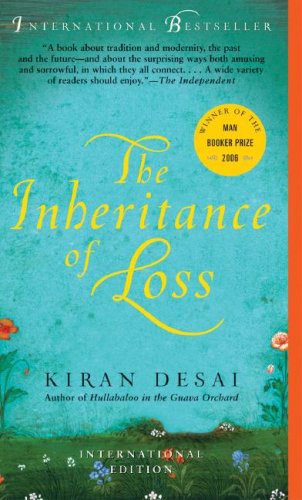Ashwin reviewed The Inheritance of Loss by Kiran Desai
Review of 'The Inheritance of Loss' on 'Goodreads'
5 stars
This book by Kiran Desai won the 2006 Booker. Set in the 1980s in Kalimpong (this is distant Himalayan India, where India blurs into Bhutan and Sikkim) the story is mainly about 3 eccentric characters -- a retired judge, his granddaughter Sai and his servile cook. While Desai goes about deliciously setting the life stories of these characters and their friends in breathtakingly beautiful Kalimpong through flashbacks and forwards, the region itself slowly falls into chaos due to the Nepalese-Indian demand for a separate nation/state of Gorkhaland. And this movement rips apart their bucolic lives revealing how gray and vulnerable they all are.
The book is lovely, the setting is beautiful and the characters remain etched forever. The prose strongly reminds me of R K Narayan and Enid Blyton. In describing the idyllic setting of Cho Oyu (the judge's home which overlooks the mighty Kanchenjunga) and Kalimpong, I'm strongly reminded …
This book by Kiran Desai won the 2006 Booker. Set in the 1980s in Kalimpong (this is distant Himalayan India, where India blurs into Bhutan and Sikkim) the story is mainly about 3 eccentric characters -- a retired judge, his granddaughter Sai and his servile cook. While Desai goes about deliciously setting the life stories of these characters and their friends in breathtakingly beautiful Kalimpong through flashbacks and forwards, the region itself slowly falls into chaos due to the Nepalese-Indian demand for a separate nation/state of Gorkhaland. And this movement rips apart their bucolic lives revealing how gray and vulnerable they all are.
The book is lovely, the setting is beautiful and the characters remain etched forever. The prose strongly reminds me of R K Narayan and Enid Blyton. In describing the idyllic setting of Cho Oyu (the judge's home which overlooks the mighty Kanchenjunga) and Kalimpong, I'm strongly reminded of Blyton (even Ruskin Bond) and her rustic settings. In the characters and their confusing mess of lives (like most of us), it is Narayan who shows through. I can't help but feel that Kalimpong and it's residents share a lot with Malgudi. It feels nostalgic of a time gone by in our childhood.
The narrative is not linear, it keeps going backward and forward. Desai takes her time in revealing the details about the 3 interesting characters in the book. It's one of the reasons the books really pulled me in, titillating all the time, to know one more bit about the judge or Sai, to understand why they are what they are in the current time. There's this whole parallel narrative about Biju, the cook's son who's an illegal immigrant in NYC. IMO the book could've done without this entire arc.
The story takes a whole plethora of tones: British Raj, nationalism, love, hate, economic/social disparities, nature and so on. The characters seem innocent at first, but as more about their past is revealed and their lives become affected by the Gorkhaland movement, we discover they're mortal too, with all kinds of gray. Full marks to Desai for bringing this about well. All the main characters have lost something in the past, and the sad part is that (this novel doesn't have much of a happy ending) they won't gain it back. I almost felt a bit of hate for Desai, for she slowly pulls apart their happy lives into a tragic puddle.
Terrific prose and setting, unforgettable characters, but a bit tragic. Recommended read.

